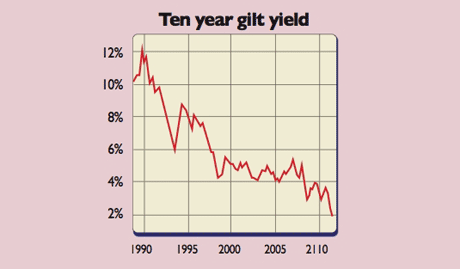The best way to short gilts
Economic recovery spells falling government bond - or 'gilt' - yields as investors are prepared to take greater risks again. But how do you short a falling gilt yield? Tim Bennett explains.
Get the latest financial news, insights and expert analysis from our award-winning MoneyWeek team, to help you understand what really matters when it comes to your finances.
You are now subscribed
Your newsletter sign-up was successful
Want to add more newsletters?

Twice daily
MoneyWeek
Get the latest financial news, insights and expert analysis from our award-winning MoneyWeek team, to help you understand what really matters when it comes to your finances.

Four times a week
Look After My Bills
Sign up to our free money-saving newsletter, filled with the latest news and expert advice to help you find the best tips and deals for managing your bills. Start saving today!
How much lower can government bond yields go? Not much, warn some heavyweight fund managers. Yields could soon rise sharply, sending prices tumbling. Are they right and what should you do?
Earlier this month, the yield on ten-year British government gilts fell to 1.9%, the lowest level for 300 years. Why? Investors have sought the relative safety of Western government bond markets since the financial crisis began. In theory, any government can go bust, but Western ones hold some ace cards.
Governments like Britain's may be hugely indebted due to overspending, but their liabilities are backed by tax revenue. That makes their IOUs safer than bonds issued by most firms. So international pension funds and other big investors, desperate to protect their capital, have been buying their IOUs.
MoneyWeek
Subscribe to MoneyWeek today and get your first six magazine issues absolutely FREE

Sign up to Money Morning
Don't miss the latest investment and personal finances news, market analysis, plus money-saving tips with our free twice-daily newsletter
Don't miss the latest investment and personal finances news, market analysis, plus money-saving tips with our free twice-daily newsletter
Factor two is quantitative easing (QE). The British government can print the money it needs to meet its liabilities. It can also buy back its own debt. To force money out of gilts and into the wider economy, the government has done just that pushing up prices and squeezing yields. So what's changed?

Nothing, according to Andrew Clare, professor of asset management at Cass Business School, writing in the FT. He reckons pent up demand from UK pension funds will keep gilt prices high (and yields low) even if foreign buyers pull out. Throw in another dose of QE after disappointing fourth-quarter 2011 GDP figures and gilt prices will ride high in 2012.
But others aren't so sure. British gilt yields are well below the rate of inflation. Investors will happily dump them and seek higher returns if the economy revives. What will the trigger be?
"The catalyst for pulling the trigger on selling gilts is the improvement in the US economy," says Peter Geikie-Cobb of the Thames River Sterling Global Bond Fund on Professionalpensions.com. He thinks improved US jobs data suggest the worst is over.
If the gloom over eurozone jobless data lifts with a successful round of sovereign debt refinancing, he sees yields on "safe" bonds "exploding" upwards. Yields on Italian bonds (which are seen as risky) have already nearly halved from a high of 7% as prices tumbled after the European Central Bank fired its "big bazooka".
Gambling on a spike in gilt yields is risky the Bank of England may hold them down for some time. And shorting government bonds directly is nigh on impossible. The best bet is a short gilt exchange-traded fund, such as db x-trackers UK Gilts Short Daily ETF (XUGS). Just don't bet the farm on it.
Get the latest financial news, insights and expert analysis from our award-winning MoneyWeek team, to help you understand what really matters when it comes to your finances.
Tim graduated with a history degree from Cambridge University in 1989 and, after a year of travelling, joined the financial services firm Ernst and Young in 1990, qualifying as a chartered accountant in 1994.
He then moved into financial markets training, designing and running a variety of courses at graduate level and beyond for a range of organisations including the Securities and Investment Institute and UBS. He joined MoneyWeek in 2007.
-
 Can mining stocks deliver golden gains?
Can mining stocks deliver golden gains?With gold and silver prices having outperformed the stock markets last year, mining stocks can be an effective, if volatile, means of gaining exposure
-
 8 ways the ‘sandwich generation’ can protect wealth
8 ways the ‘sandwich generation’ can protect wealthPeople squeezed between caring for ageing parents and adult children or younger grandchildren – known as the ‘sandwich generation’ – are at risk of neglecting their own financial planning. Here’s how to protect yourself and your loved ones’ wealth.
-
 FCA greenlights the first Long Term Asset Fund
FCA greenlights the first Long Term Asset FundNews City watchdog authorises the first Long Term Asset Fund - we explain what they are and how investors can use them.
-
 2022: what doesn’t kill you makes you stronger
2022: what doesn’t kill you makes you strongerAdvertisement Feature Ben Ritchie and Rebecca Maclean, Investment Managers, Dunedin Income Growth Investment Trust PLC
-
 Seize these investment trust bargains in 2022
Seize these investment trust bargains in 2022Tips Attractive investment trusts are trading at a discount, and those waiting for the perfect time to buy will miss out. Max King picks a selection of the best investment trusts to buy for 2022.
-
These index-linked gilts look too expensive
Features On the face of it, buying index-linked exchange-traded funds to insure against a revival of inflation seems sensible. But this particular fund is too expensive for a number of reasons, says Paul Amery.